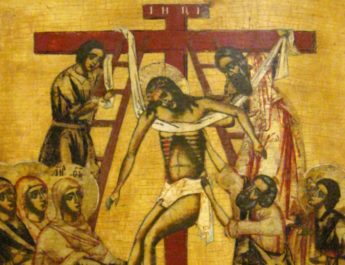1 Peter 3:13-22
Narrative Lectionary
13 Now who will harmA you if you are eagerB to doC what is good?D
A “harm” = kakoo. 6x in NT. From kakos (bad, evil, harm, ill; evil that is part of someone’s core character – intrinsic, rotted, worthless, depraved, causing harm; deep inner malice that comes from a rotten character; can be contrasted with the Greek poneros, which is that which bears pain – a focus on the miseries and pains that come with evil; also contrasting the Greek sapros, which deals with falling away from a previously embodied virtue). This is to afflict, mistreat, hurt, embitter, harm, injure. Figuratively, it can mean to exasperate or entreat evil.
B “eager” = zelotes. 8x in NT. From zeloo (jealous, eager for, burning with zeal, deeply committed, envy); from zelos (eagerness or zeal on the one hand or rivalry and jealousy on the other; burning anger or burning love) perhaps from from zeo (to boil, be hot, ferment, bubble, boil, or glow; used figuratively for being fervent or earnest). This is zealous or a zealot – someone eagerly devoted to someone or something. This is where the word “zealot” comes from.
C “do” = ginomai. This is to come into being, to happen, become, be born; to emerge from one state or condition to another. This is coming into being with the sense of movement or growth.
D “good” = agathos. This is good, a benefit, or a good thing. It is good by its very nature, intrinsically good. A different word, kalos, refers to external signs of goodness.
14 But even if you do sufferE for doing what is right,F you are blessed.G Do not fearH what they fear,I and do not be intimidated,J
E “suffer” = pascho. Akin to penthos (mourning, sorrow). This is to be acted on for good or ill. It is often used for negative treatment. Properly, it means feeling strong emotions – especially suffering. It can also be the ability to feel suffering.
F “what is right” = dikaiosune. From dikaios (correct, righteous – implies innocent; this is that which conforms to God’s notion of justice, uprightness); from dike (the principle of justice; that which is right in a way that is very clear; a decision or the execution of that decision; originally, this word was for custom or usage; evolved to include the process of law, judicial hearing, execution of sentence, penalty, and even vengeance; more commonly, it refers to what is right); may be from deiknumi (to show, point out, exhibit; figurative for teach, demonstrate, make known). This is judicial or divine approval of character or action. This is righteousness, justice, justness, divine righteousness.
G “blessed” = makarios. From makar (happy); from mak– (to become long or large). This is blessed, happy, fortunate. It is when God’s grace/abundance is extended.
H “fear” = phobeo. Related to “what…fear” in v14. From phobos (see note I below). This is also to put to flight, terrify, frighten, dread, reverence, to withdraw or avoid. It is sometimes used in a positive sense to mean the fear of the Lord, echoing Old Testament language. More commonly, it is fear of following God’s path. This is where the word phobia comes from.
I “what…fear” = phobos. From phebomai (to flee, withdraw, be put to flight). This is panic flight, fear, fear being caused, terror, alarm, that which causes fear, reverence, respect.
J “be intimidated” = tarasso. 18x in NT. This is trouble, agitate, stir up. It is motion back and forth, creating inner turmoil or confusion, roiling water.
15 but in your heartsK sanctifyL ChristM as Lord.N Always be ready to make your defenseO to anyone who demands from you an accountingP for the hopeQ that is in you;
K “hearts” = kardia. Literally the heart, but figuratively mind, character, inner self, will, intention, thoughts, feelings. Also, the center of something. The word heart is only used figuratively in the Old and New Testaments. This is where “cardiac” comes from.
L “sanctify” = hagiazo. From hagios (sacred, holy, set apart, different other; physically pure, morally blameless, or ceremonially set apart); from hagnos (holy, sacred, pure ethically, ritually, or ceremonially; prepared for worship, chaste, unadulterated, pure to the core; undefiled by sin; figurative for innocent, modest, perfect). This is to make holy, consecrate, sanctify, set apart as holy, purify, venerate.
M “Christ” = christos. From chrio (consecrate by anointing with oil; often done for prophets, priests, or kings). Literally, the anointed one, Christ. The Greek word for Messiah.
N “Lord” = kurios. From kuros (authority, supremacy). This is a respectful address meaning master or sir. It refers to one who has control or power greater than one’s own. So, it was also applied to God and Jesus as Master or Lord.
O “defense” = apologia. 8x in NT. From apologeomai (to make an accounting or defend oneself – particularly in court; present prof or evidence using sound logic); {from apo (from, away from) + logos (word, statement, speech, analogy; a word that carries an idea or expresses a thought, a saying; a person with a message or reasoning laid out in words; by implication, a topic, line of reasoning, or a motive; can be used for a divine utterance or as Word – Christ); from lego (to speak, tell, mention)}. This is a verbal defense, especially in a legal setting, that is well reasoned to respond to the issue at hand. It is an apology, clearing, plea, or vindication.
P “accounting” = logos. Related to “defense” in v15. See note O above.
Q “hope” = elpis. From elpo (to anticipate, welcome, expect; usually to anticipate positively). This is expectation, hope, trust, confidence faith. The expectation can be abstract or concrete.
16 yet do it with gentlenessR and reverence.S Keep your conscienceT clear,U
R “gentleness” = prautes. 12x in NT. From praus (gentle, meek, which implies humility); related to praios (meek, gentle, kind); related to praotes (mildness kindness, meekness; being temperate – gentle, but strong; implies humility). This is gentleness, mildness, meekness, or humility. It is strength mixed with gentleness.
S “reverence” = phobos. Same as “what…fear” in v14. See note I above.
T “conscience” = suneidesis. From suneidon (to see together and so know, realize, consider, be conscious of); {from sun (with, together with) + eidon (shape, appearance, kind; something observable; form in a literal or figurative sense); from eido (to know, remember, perceive – to see and so understand)}. This is properly to know together. The conscience, found in all, is a moral and spiritual capacity granted by God so that we can understand together what is good and right.
U “clear” = agathos. Same as “good” in v13. See note D above.
so that, when you are maligned,V those who abuseW you for your good conductX in Christ may be put to shame.Y
V “maligned” = katalaleo. 5x in NT. From katalalos (talking against, slanderer, slanderous, defamer); {from kata (down, against, throughout, among) + laleo (to talk, say, preach); {from lalos (talkative)}}. This is literally to speak down so it is to speak evil or to speak to in a hostile way. It is speaking with the intent to harm someone’s reputation.
W “abuse” = epereazo. 2x in NT. From epereia (spiteful abuse) OR from epi (on, upon, what is fitting) + areia (threats). This is to insult, mistreat, or slander. It includes making threats or smearing another’s reputation. It is reviling that is tailored to someone in particular.
X “conduct” = anastrophe. 13x in NT. From anastrepho (to turn back, return, or overturn; can also imply busying oneself and so to remain, dwell, behave, or live somewhere); {from ana (up, again, back, among, anew) + strepho (to turn, change, turn back, be converted; to turn around completely to take the opposite path or a completely different one); {from trope (turning, shifting, a revolution; figuratively, a variation); from trepo (to turn)}. This is behavior, conduct, life, or manner of life. It is behavior drawn from core beliefs.
Y “put to shame” = kataischuno. 13x in NT. From kata (down, against, according to, among) + aischunomai (to dishonor, put to shame, shrink, disfigure) [from aischos (shame, disgrace, disfigurement)]. This is literally to shame down, which is to say disgrace or implying make someone blush. It can be frustrate, dishonor, confound or shame.
17 For it is betterZ to suffer for doing good, if suffering should beAA God’sBB will,CC than to suffer for doing evil.DD
Z “better” = kreitton. 15x in NT. From the same as kratistos (strongest, noblest – high in dignity or honor; used to speak to a high ranking Roman; can also differentiate an equestrian from a senator); from kratus (strong); from kratos (strength, power, dominion; vigor in a literal or figurative sense; power that is exercised). This is stronger, better, more dominant or nobler. It is better in the sense that it is mastered or developed.
AA “be” = thelo. This is to wish, desire, will, or intend. It is to choose or prefer in a literal or figurative sense. It can also mean inclined toward or take delight in. It can have a sense of being ready to act on the impulse in question.
BB “God’s” = theos. From Proto-Indo-European origins, meaning do, put, place. This is God or a god in general.
CC “will” = thelema. Related to “be” in v17. From thelo (see note AA above). This is the act of will, choice, purpose, or decree.
DD “doing evil” = kakopoieo. Related to “harm” in v13. 4x in NT. From kakopoios (evildoer, one who inflicts harm or damage, criminal); {from kakos (see note A above) + poieo (to make, do, construct, accomplish)}. This is to do evil or harm, to commit sin. It is one who acts from an inner, evil core.
18 For Christ also suffered for sinsEE once for all, the righteousFF for the unrighteous,GG in order to bring you to God.
EE “sins” = hamartia. From hamartano (to miss the mark, do wrong, make a mistake, sin); {from a (not) + meros (a part or share)}. Literally, this means not having one’s share or portion – like not receiving inheritance or what was allotted to you. This word means missing the mark so it is used for guilt, fault, and acts of sin.
FF “righteous” = dikaios. Related to “what is right” in v14. From dike (see note F above). This is correct, righteous, just, or a righteous person. It implies innocent or conforming to God’s standard of justice.
GG “unrighteous” = adikos. Related to “what is right” in v14 & “righteous” in v18. 12x in NT. From a (not, without) + dike (see note F above). This is unjust or wicked. It is one who violates God’s law. By implication, it refers to someone who is treacherous. It can also be used more broadly for someone of a different faith.
He was put to deathHH in the flesh,II but made alive in the spirit,JJ 19 in which also he wentKK and made a proclamationLL to the spirits in prison,MM
HH {untranslated} = men. This is truly, indeed, even, in fact. Often, it is not translated, but used to emphasize affirmation.
II “flesh” = sarx. May be from saroo (to sweep, cleanse by sweeping); from sairo (to brush off). This is flesh, the body, human nature, materiality, kindred. Flesh is not always evil in scripture (as when it refers to Jesus taking on a human body). However, it is generally used in a negative way for actions made selfishly and not through faith. This can mean animal flesh, i.e. meat, or refer to body in contrast to soul/spirit. Flesh can be a way of talking about how things or people are related or talking about human frailty (physical or moral).
JJ “spirit” = pneuma. From pneo (to blow, breath, breathe hard). This is wind, breath, or ghost. A breeze or a blast or air, a breath. Figuratively used for a spirit, the human soul or part of us that is rational. It is also used supernaturally for angels, demons, God, and the Holy Spirit. This is where pneumonia comes from.
KK “went” = poreuomai. From poros (ford, passageway). This is to go, travel, journey, or die. It refers to transporting things from one place to another and focuses on the personal significance of the destination.
LL “made a proclamation” = kerusso. This is to proclaim, preach, publish. Properly, it is to act as a herald – announcing something publicly with confidence and/or to persuade.
MM “prison” = phulake. From phulasso (to guard something so that it doesn’t escape – to watch over it vigilantly; being on guard in a literal or figurative sense); related to phulaks (military guard, sentry, watcher). This is the act of guarding, the person who guards, the place where guarding occurs (i.e. a prison), or the times of guarding (the various watches).
20 who in former times did not obey,NN when God waitedOO patientlyPP in the days of Noah,QQ
NN “did not obey” = apeitheo. 14x in NT. From apeithes (unbelieving, disobedient, spiritually rebellious); {from a (not, without) + peitho (to have confidence, urge, be persuaded, agree, assure, believe, have confidence, trust)}. This is to disobey or rebel. It refers to those who refuse to be convinced of something – willful disbelief.
OO “waited” = apekdechomai. 8x in NT. From apo (from, away from) + ekdechomai (to take or receive, expect, await; to welcome someone from your heart; focusing on the goal of waiting or the outcome); {from ek (from, from out of) + dechomai (to warmly receive, be ready for what is offered, take, accept, or welcome; to receive in a literal or figurative sense)}. This is eager awaiting or fully expecting something.
PP “patiently” = makrothumia. 14x in NT. From makros (long, long lasting) {from mekos (length); probably related to megas (great or large)} + thumos (passion, wrath; actions emerging from passion or impulse) {from thuo (to rush along, breathe violently, offer sacrifice)}. Properly, this is long-passion or long-suffering – one who waits the needed amount of time before expressing anger. This is also patience, perseverance, and fortitude.
QQ “Noah” = noe. From Hebrew nuach (to rest, calm, camp, free, place, remain, satisfy, settle, station, or wait; implies settling down in a literal or figurative sense). This is Noah, meaning rest.
during the buildingRR of the ark,SS in which a few, that is, eight persons,TT were savedUU through water.
RR “building” = kataskeuazo. 11x in NT. From kata (down, against, among, throughout) + skeuazo (to prepare using a tool); {from skeuos (tool, container, property, goods)}. This is to prepare, build, or ordain. It denotes preparing with the use of tools and with skill.
SS “ark” = kibotos. 6x in NT. This is a wooden box or chest. It also refers to Noah’s ark and the ark of the covenant.
TT “persons” = psuche. From psucho (to breathe, blow). This is breath, the breath of life, the self, individual, soul. This is the word for that which makes a person unique – their identity, will, personality, affections. This isn’t the soul as the immortal part of us, but as our individuality. It is also not life as a general concept, but specific to people. This is where the words psyche and psychology come from.
UU “saved” = diasozo. 8x in NT. From dia (through, across to the other side, thoroughly) + sozo (to save, heal, rescue); {from sos (safe, well, rescued)}. This is thoroughly saved or delivered from danger. It can also be to make someone entirely whole, to cure, or preserve.
21 And baptism,VV which this prefigured,WW now savesXX you—not as a removal of dirtYY from the body,ZZ but as an appeal to God for a good conscience, through the resurrectionAAA of JesusBBB Christ,
VV “baptism” = baptisma. From baptizo (to submerge, wash, or immerse; used specially for baptism); from bapto (to dip or dye; to entirely cover with liquid, to stain). This is dipping or sinking. Also, the rite of baptism.
WW “prefigured” = antitupos. 2x in NT. From anti (opposite, instead of, against) + tupos (figure, model, image, impression, pattern, copy; properly, a model created through much repetition so figuratively the proper model; the impression of a stamped image, the mark of a scar, the shape of a statue; figuratively, it can refer to a style or resemblance; used specially for a model as something to imitate or as a cautionary tale); {from tupto (to strike repeatedly, wound, punish; figuratively to offend)}. This is corresponding to or typical if. It can refer to an image copy, counterpart, or figure. It can also be a predictive symbol.
XX “saves” = sozo. Related to “saved” in v20. See note UU above.
YY “dirt” = rhupos. 1x in NT. This is filth, dirt, or grease. Figuratively, it can be depravity or an impurity resulting from immorality.
ZZ “body” = sarx. Same as “flesh” in v18.
AAA “resurrection” = anastasis. From anistemi (to raise up, rise, appear; to stand up literally or figuratively. Can also mean to resurrect); from ana (upwards, up, again, back, anew) + histemi (to make to stand, place, set up, establish, appoint, stand by, stand still, stand ready, stand firm, be steadfast). This is literally standing up or standing again. It is used figuratively for recovering a spiritual truth. It can be raising up, rising, or resurrection.
BBB “Jesus” = iesous. From Hebrew Yehoshua (Joshua, the Lord is salvation); {from YHVH (proper name of the God of Israel; the self-existent and eternal one); {from havah (to become) or from hayah (to come to pass, become, be)} + yasha (to deliver, defend, help, preserve, rescue; properly, to be open, wide or free, which implies being safe. So, in a causative sense, this is to free someone). This is Jesus or Joshua in Greek – the Lord saves or the Lord is salvation.
22 who has gone into heavenCCC and is at the right handDDD of God, with angels,EEE authorities,FFF and powersGGG made subject to him.
CCC “heaven” = ouranos. May be related to oros (mountain, hill) with the notion of height. This is the air, the sky, the atmosphere, and heaven. It is the sky that is visible and the spiritual heaven where God dwells. Heaven implies happiness, power, and eternity.
DDD “right hand” = dexios. Perhaps from dechomai (to warmly receive, be ready for what is offered, take, accept, or welcome; to receive in a literal or figurative sense). This is right, right side, or the right hand.
EEE “angels” = aggelos. Related to “bring” in v18. 14x in NT. From ana (up, again, back, among, by, anew) + aggello (to announce, report) {from aggelos (angel, messenger – supernatural or human envoy of God); probably from ago (lead, bring, drive, carry, guide, go)}. This is returning with word, reporting, declaring, announcing. It is to tell something all the way, which is to say to tell it clearly.
FFF “authorities” = exousia. From exesti (to be permitted or lawful); {from ek (out, out of) + eimi (to be, exist)}. This is power to act or weight. It especially denotes moral authority or influence. It can mean domain, liberty, freedom, capacity, mastery, right, force, or strength.
GGG “powers” = dunamis. From dunamai (to be able, have power or ability). This is might, strength, physical power, efficacy, energy, and miraculous power. It is force literally or figuratively – the power of a miracle or the miracle itself.
Image credit: “Prayer of Saint Francis” by Brother Eric from the Church of Reconciliation in Taize, France.




